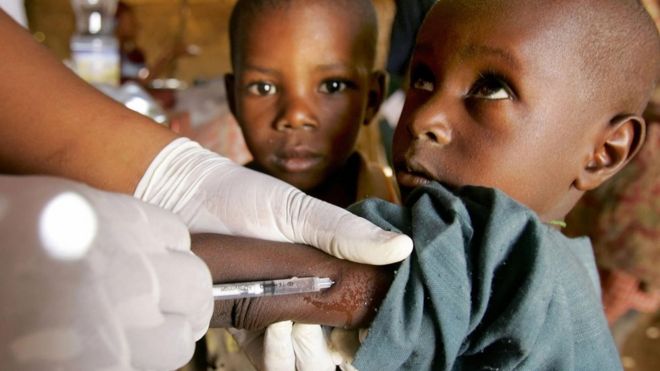
A mass vaccination programme against meningitis A in Africa has been a "stunning success", say experts.
More than 220 million people were immunised across 16 countries in the continent's meningitis belt.
In 2013 there were just four cases across the entire region, which once faced thousands of deaths each year.
However, there are fresh warnings from the World Health Organization that "huge epidemics" could return unless a new vaccination programme is started.
The meningitis belt stretches across sub-Saharan Africa from Gambia in the west to Ethiopia in the east.
In the worst epidemic recorded, in 1996-97, the disease swept across the belt infecting more than a quarter of a million people and led to 25,000 deaths.
Unlike other vaccines, the MenAfriVac was designed specifically for Africa and in 2010 a mass vaccination campaign was started.
Laboratory-confirmed cases of meningitis A have been falling ever since:
- 2009 - 1,994 cases
- 2010 - 430 cases
- 2011 - 111 cases
- 2012 - 49 cases
- 2013 - four cases
"The disease has virtually disappeared from this part of the world," said Dr Marie-Pierre Preziosi from the World Health Organization.
Still vulnerable
The mass immunisation programme was aimed at people under 30.
However, routine vaccination will be needed to ensure that newborns are not vulnerable to the disease.
Projections, published in the journal Clinical Infectious Diseases, showed the disease could easily return.
Dr Preziosi told the BBC News website: "What could happen is a huge epidemic that could sweep the entire area, that could target hundreds of thousands of people with 5-10% deaths at least.
"There will be major epidemics in 10 to 15 years, so the call to countries now is, 'Do not stop your efforts - you need to introduce the vaccine into routine immunisation programmes.'"
A new vaccine has been approved for children between nine and 18 months old. Ghana is introducing the jab and eight more countries are lining up to do so next year.
'Unpredictable'
Dr Mark Alderson, from the global non-profit healthcare organisation Path, told the BBC: "It is a remarkable success story."
However, he warned other types of meningitis - C, Y, W and X - were also a threat.
He added: "Outbreaks of other sera groups are unpredictable and meningitis C is Niger is a case in point.
"If meningitis A is gone there will continue to be outbreaks in the other sera groups. If we really want to eliminate meningitis from the meningitis belt then the best way is to introduce a polyvalent vaccine [against A, C, Y, W and X]."
Meningitis A strikes in the the dry season in Africa and while it starts like a cold with headache and fever it can soon lead to convulsions, coma and death.
No comments:
Post a Comment